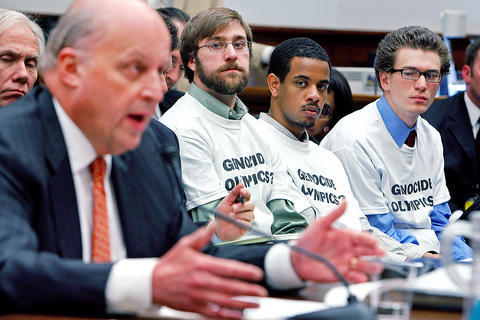Staff Writer, with CNA, Washington
Taiwan is fully committed to upholding both its defense and democratic ideals in the face of a military threat from China, a Taiwanese official in the US said yesterday.
Director of the Press Division at the Taipei Economic and Cultural Representative Office Eddy Tsai said the stability and security that the US brings to the Asia-Pacific region by selling arms to its allies and by taking a firm stand for freedom sends a message not only to China, but also to others who question the US' resolve to stand up for democracy overseas.

PHOTO: AFP
"Suggesting that it may be better to abandon Taiwan's 23 million citizens to the tender mercies of Beijing serves only to dilute this message and increases the chances of miscalculation," Tsai argued in a letter to the editor printed in the Wall Street Journal.
The letter, titled "Three Myths About Taiwan's Defense," was a response to an April 23 article titled "Taiwan's Free Ride on US Defense," written by Ted Galen Carpenter, vice president for defense and foreign policy studies at the Cato Institute.
Carpenter claimed that the Taiwan legislature's reluctance to pass a special budget for arms procurement from the US "leaves America in the unenviable position of having an implicit commitment to defend a fellow democracy that doesn't seem especially interested in defending itself."
Tsai said that Carpenter's argument was based on three "regrettable myths" about Taiwan's defense situation, namely that Taiwan's defense investment continues to shrink as China's rises, that Taiwan seems intent on starting a war with China through provocative policies, and that the long-stalled arms package would have been passed by now if Taiwan were still an authoritarian party-state.
He noted that Taiwan's defense budget will increase from 2.2 percent of its GDP last year to a proposed 2.85 percent this year and to 3 percent next year.
Citing a report released last year by the US Congressional Research Service, Tsai said Taiwan received US$13.9 billion in arms deliveries from various sources between 1998 and 2005, making it the third largest such recipient among developing countries.
Also, much of Taiwan's defense budget has been spent on expensive military software that often costs even more than missile hardware the country purchases, Tsai said.
Concerning Taiwan's "provocative" cross-strait policies, Tsai said that Taiwan had tried to reach out to China with initiatives such as a proposed demilitarized zone along the middle of the Taiwan Strait, confidence-building measures to avoid miscalculation, and direct charter flights.
He said the standoff over the procurement bill was testimony to the commitment to democracy: "Long gone are the days when an authoritarian government in Taipei could pass laws by executive fiat regardless of political opposition."

Japanese footwear brand Onitsuka Tiger today issued a public apology and said it has suspended an employee amid allegations that the staff member discriminated against a Vietnamese customer at its Taipei 101 store. Posting on the social media platform Threads yesterday, a user said that an employee at the store said that “those shoes are very expensive” when her friend, who is a migrant worker from Vietnam, asked for assistance. The employee then ignored her until she asked again, to which she replied: "We don't have a size 37." The post had amassed nearly 26,000 likes and 916 comments as of this

US President Donald Trump said "it’s up to" Chinese President Xi Jinping (習近平) what China does on Taiwan, but that he would be "very unhappy" with a change in the "status quo," the New York Times said in an interview published yesterday. Xi "considers it to be a part of China, and that’s up to him what he’s going to be doing," Trump told the newspaper on Wednesday. "But I’ve expressed to him that I would be very unhappy if he did that, and I don’t think he’ll do that," he added. "I hope he doesn’t do that." Trump made the comments in

Tourism in Kenting fell to a historic low for the second consecutive year last year, impacting hotels and other local businesses that rely on a steady stream of domestic tourists, the latest data showed. A total of 2.139 million tourists visited Kenting last year, down slightly from 2.14 million in 2024, the data showed. The number of tourists who visited the national park on the Hengchun Peninsula peaked in 2015 at 8.37 million people. That number has been below 2.2 million for two years, although there was a spike in October last year due to multiple long weekends. The occupancy rate for hotels

A cold surge advisory was today issued for 18 cities and counties across Taiwan, with temperatures of below 10°C forecast during the day and into tonight, the Central Weather Administration (CWA) said. New Taipei City, Taipei, Taoyuan and Hsinchu, Miaoli and Yilan counties are expected to experience sustained temperatures of 10°C or lower, the CWA said. Temperatures are likely to temporarily drop below 10°C in most other areas, except Taitung, Pingtung, Penghu and Lienchiang (Matsu) counties, CWA data showed. The cold weather is being caused by a strong continental cold air mass, combined with radiative cooling, a process in which heat escapes from